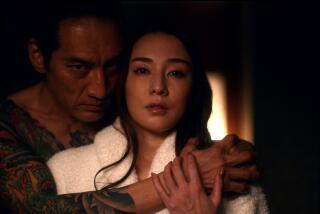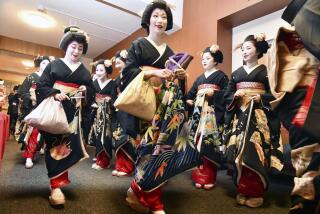FILM : Victims of âPleasure Districtâ Helped Switch Red Light Off
Less than a year after Kenji Mizoguchiâs âStreet of Shameâ was released--creating a stir in both Tokyoâs red-light district where it is set and the halls of government where it was studied--prostitution was abolished in Japan.
The 1956 movie, Mizoguchiâs last and probably his most influential, is credited with doing much to bring about that ban. Through an almost clinical look at four courtesans barely getting by in postwar Japan, âStreet of Shameâ (screening Friday at UC Irvine) helped to galvanize public opinion, changing what had once been a generally accepted institution into a symbol of exploitation for many.
Mizoguchi accomplished that by avoiding any of the glamour or historical associations tied to the Yoshiwara neighborhood, where prostitution flourished for centuries. Forgetting that these working girls were once considered star entertainers steeped in tradition, he focused instead on how Tokyoâs âpleasure districtâ had slipped after the war.
The victims of this new order are Yumiko (Aiko Mimasu), Hanae (Michiyo Kogure), Yasumi (Ayako Wakao) and Mickey (Machiko Kyo), all available at Dreamland, one of Tokyoâs more notorious houses. Mizoguchi interweaves the lives of the four women in a quickly paced, loosely connected narrative, giving each story equal weight.
The saddest tales belong to Hanae and Yumiko. Hanae works to keep her family together, a daunting task. Her husband has tuberculosis and she canât afford the medicine he requires or the food her infant needs. Sheâs caught in a cycle, unable to pay off her debts to Dreamlandâs proprietors and forced to continue a trade she finds demeaning.
Yumikoâs story is also wrenching. To pay for her sonâs education, she works overtime, to the point of exhaustion. Her love is unrewarded, though; after discovering her livelihood by accident one night, the son rejects her, leading to Yumikoâs breakdown.
Yasumi and Mickey are different cases. Their experiences have left them hard and amoral. Yasumi, Dreamlandâs most beautiful attraction, manipulates her clients, using them as easily as they use her. Mickey, who has apprenticed herself with American soldiers before coming to Dreamland, seems to have no convictions at all. Both women, Mizoguchi informs us, are playing out angers against fathers who abandoned them.
In an ironic foreshadowing of the government debate that came after the filmâs release, Mizoguchi and screenwriter Masashige Narusawa place the womenâs stories against the tension created by zealous officials who want to outlaw prostitution. Besides empowering âStreet of Shameâsâ accusative tone, Mizoguchi employs the plot element to portray Dreamlandâs bosses as a small step above slave owners.
While deriding the plan, one of the proprietors cynically boasts that the houses have made life easier for his girls, that earning money on the streets without protection would be disastrous. That may be true, but the women know that as long as they are unable to pay off their debts, theyâre indentured to the houses.
And they also know how degrading that life is. When Yumiko shows her anxiety over her son one morning, she is quickly scolded, âDonât look haggard. Youâre for sale.â
What: Kenji Mizoguchiâs âStreet of Shame.â
When: Friday, Nov. 1, at 7 and 9 p.m.
Where: UC Irvineâs Student Center Crystal Cove Auditorium.
Whereabouts: Take the San Diego (405) Freeway to Jamboree Road and head south. Go east on Campus Drive to Bridge Road. Take Bridge Road into the campus.
Wherewithal: $2 to $4.
Where to Call: (714) 856-6379.
SPECIAL SCREENINGS, Page 19
More to Read
Only good movies
Get the Indie Focus newsletter, Mark Olsen's weekly guide to the world of cinema.
You may occasionally receive promotional content from the Los Angeles Times.










